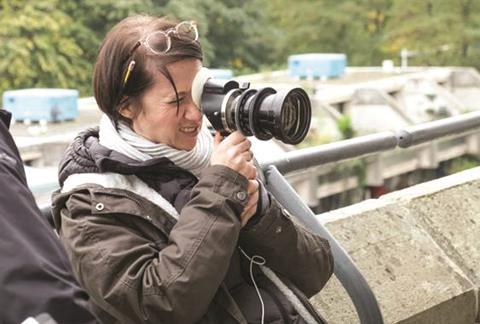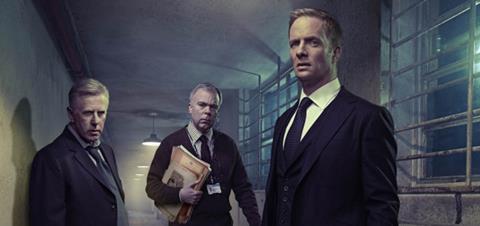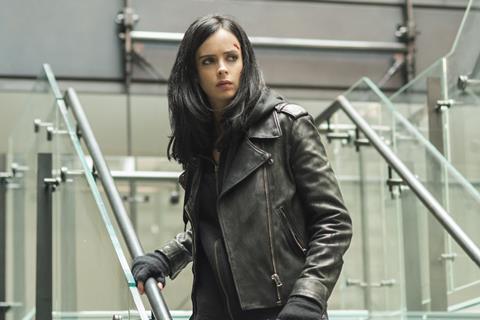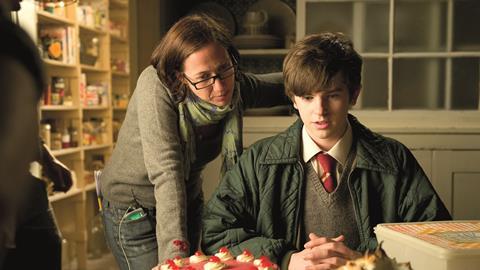One of the most sought-after TV directors talks to Jesse Whittock about how she develops a show’s vocabulary
SJ Clarkson’s childhood ambition was different to that of most kids: she wanted to make it rain. Not in the splashy hip-hop sense; she meant it literally.
“At a very young age, I saw Singin’ In The Rain at the theatre,” she says. “I saw them make it rain on stage and I wanted to know who got to do that. That was the job I wanted.”
Fast forward to 2019 and Clarkson (pictured above with Freddie Highmore) is one of the UK’s most well-respected television directors, responsible for overseeing superhero stunts in high-profile dramas including Netflix’s Marvel series Jessica Jones and The Defenders.
Simon Pegg, who Clarkson was due to direct in a fourth instalment of the Star Trek franchise before it was reportedly shelved, called her “super smart” and “a bag of ideas”.
“Even now, I’m always asking how we can make things happen with a camera,” says Clarkson. “How do you create that spectacle and magic?”

Clarkson is speaking to Broadcast from the Belfast set of her biggest undertaking to date – HBO’s Game Of Thrones prequel.
She has been sworn to secrecy about the project, which the US premium cable channel and Sky Atlantic hope can pick up where its record-busting predecessor left off earlier this year.
It is known that the producers would like the series to be narratively expansive and have a distinctive look – both traits in which Clarkson can consider herself an expert.
“It’s about world building in a new way, but that’s a story for another day as I’ve signed so many NDAs,” she says.
The show has taken up her every waking hour for the past six months, meaning issues such as the writers and agents dispute raging in the US have almost completely passed her by.
“I’ve been so busy with the pilot that I feel a little bit on the outside,” she says. “I’ve been on this 24/7 and feel like I’m in a bubble.”
Clarkson notes that making deals with talent is evolving as the high-end drama wave continues to roll across the international TV landscape.
“I’m at a point in my career where I have a quote and things that come as standard – but in broad terms, you want to know that if you’ve been part of the realisation of a creative world then that is recognised.”
Clarkson’s career began at the BBC, which she joined after a stint at a New York film school, having spent a formative spell in theatre working for Cameron Mackintosh, the producer behind the Singin’ In The Rain stunt she witnessed as a child.
At the BBC, she progressed to the documentary and factual division, where she worked under execs such as Jane Lush and Donna Taberer. They identified her talent for story telling and encouraged her to become a researcher, and later an assistant producer.
Breakout shows
Clarkson’s first TV directing jobs were on shows including EastEnders, Bad Girls and Doctors, but it was during a period in the late 2000s when she rose to attention, via ITV’s Whitechapel (which regularly drew audiences of 9 million) and the BBC’s Life On Mars and Mistresses, the latter of which she co-created with Lowri Glain.
Both series now rank among the BBC’s most-formatted scripted programmes, alongside the likes of The Office and Luther.

Clarkson became a commodity in Hollywood after she headed to the US to promote an early version of Mistresses, which was eventually remade by ABC in 2012.
“I went to the TCAs and received several offers of representation from agents before signing with Endeavor [now WME Entertainment],” she says.
“Within three months, I was taking meetings and ended up doing Heroes, Dexter and Ugly Betty that year. It was so unexpected because I never set out to be an episodic television director in America; it was just an opportunity that came along.”
Clarkson has gone on to direct dozens of episodes of American TV while also working on British dramas such as BBC1’s Toast, and is credited for establishing the look and feel of Netflix’s Jessica Jones and its spin-off mini-series, The Defenders.
She says being given the opportunity to create the Marvel Universe shows back-to-back meant she could fully commit to the projects, while many directors struggle to manage their time as demand for content increases, propelled by SVoD services.
“Setting up a show, you’re always trying to establish the cinematic vocabulary. With Jessica Jones, I could just see this steely blue colour, due to her character”
Jessica Jones encapsulates Clarkson’s instinctive sense of whether a project will suit her.
“When you’re setting up a show, you’re always trying to establish its cinematic vocabulary,” she says. “If I don’t see it first time around, it’s probably not for me. With Jessica Jones, I could just see this steely blue colour, due to her character.”
Clarkson often obscured Jones (Krysten Ritter) using people or objects in the foreground and shot her using long and grainy lenses to refl ect her troubled past.

“You start to find the vocabulary of the show through strict rules around colour palates and lenses,” she says.
“Once you’ve set up the vernacular, any other director who comes in has it as the basis. You want others to find new angles and see things you haven’t, but to use that initial framework.”
With the GoT prequel likely to launch towards the end of 2020, Clarkson – who is also an executive producer on the show – has time to create the framework for what will almost certainly be one of the most expensive and lavish productions HBO has produced.
However, Clarkson says her passion is as much for subtle moments as splashy set pieces.
“Stunts are great and you’re always excited to try bigger ones, but it is those moments in the rain that can create the cinematic beauty that I’m attracted to,” she says. “I want to make the everyday and the mundane beautiful.”
And did she ever actually make it rain indoors?
“When I did Vinyl for HBO, we had musical interstitials in the show,” she says.
“I wanted to do one with the Janis Joplin song Cry Baby. Richie Finestra, the main character, had just been told the shitty news after someone had set light to a bunch of tapes, which had set off the office sprinkler system – so I finally got to do it.”










No comments yet